#The Arabs: A History
Text
17/12/23 this masterlist has been completely, vetted, revamped and reformatted with free access to all reading and viewing material. It will be updated and edited periodically so please click on my username and reblog the current version directly from me if you're able.
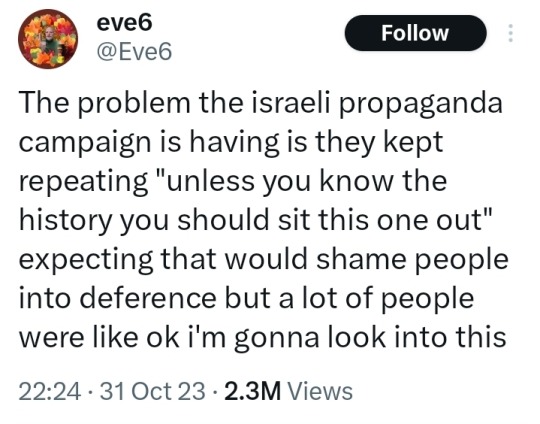
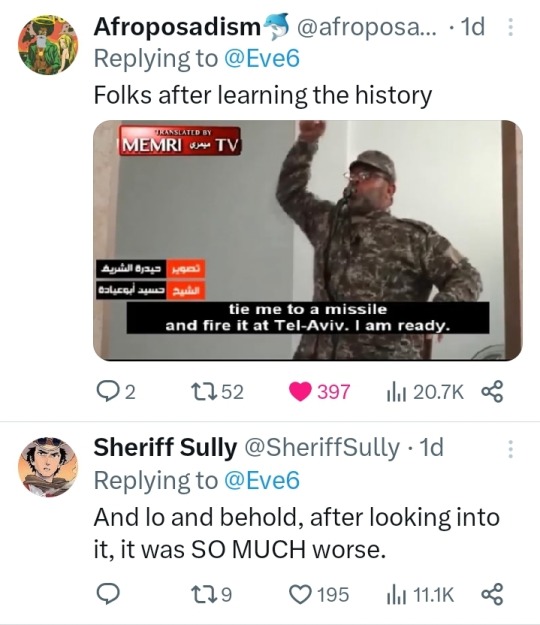

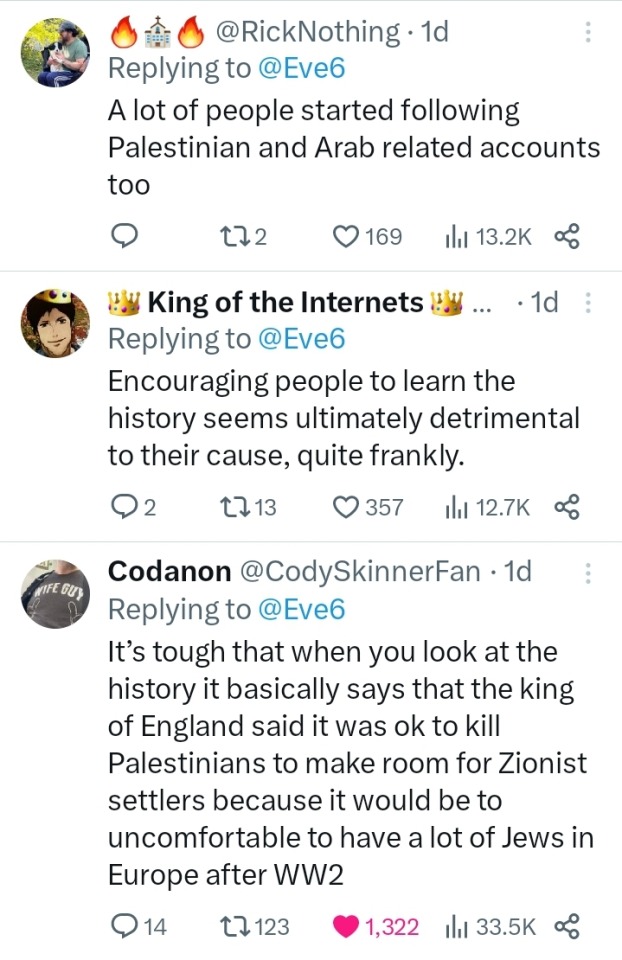
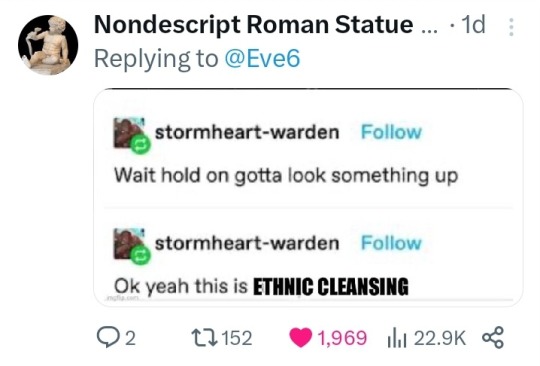
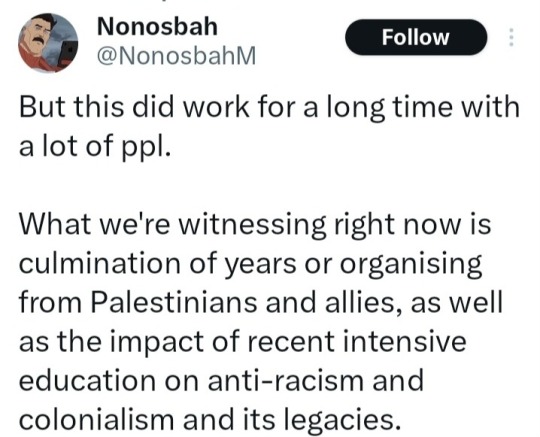
The Big Damn List Of Stuff They Said You Didn't Know
(Yes, it's a lot. Just choose your preferred medium and then pick one.)
Podcasts
Backgrounders and Quick Facts
Interactive Maps
Teach-Out Resources
Reading Material (free)
Films and Documentaries (free)
Non-Governmental Organizations
Social Media
How You Can Help
Podcasts
Cocktails & Capitalism: The Story of Palestine Part 1, Part 3
It Could Happen Here: The Cheapest Land is Bought with Blood, Part 2, The Balfour Declaration
Citations Needed: Media narratives and consent manufacturing around Israel-Palestine and the Gaza Siege
The Deprogram: Free Palestine, ft. decolonizatepalestine.com.
Backgrounders and Quick Facts
The Palestine Academy: Palestine 101
Institute for Middle East Understanding: Explainers and Quick Facts
Interactive Maps
Visualizing Palestine
Teach-Out Resources
1) Cambridge UCU and Pal Society
Palestine 101
Intro to Palestine Film + Art + Literature
Resources for Organising and Facilitating)
2) The Jadaliya YouTube Channel of the Arab Studies Institute
Gaza in Context Teach-in series
War on Palestine podcast
Updates and Discussions of news with co-editors Noura Erakat and Mouin Rabbani.
3) The Palestine Directory
History (virtual tours, digital archives, The Palestine Oral History Project, Documenting Palestine, Queering Palestine)
Cultural History (Palestine Open Maps, Overdue Books Zine, Palestine Poster Project)
Contemporary Voices in the Arts
Get Involved: NGOs and campaigns to help and support.
3) PalQuest Interactive Encyclopedia of the Palestine Question.
4) The Palestine Remix by Al Jazeera
Books and Articles
Free reading material
My Gdrive of Palestine/Decolonization Literature (nearly all the books recommended below + books from other recommended lists)
Five free eBooks by Verso
Three Free eBooks on Palestine by Haymarket
LGBT Activist Scott Long's Google Drive of Palestine Freedom Struggle Resources
Recommended Reading List
Academic Books
Edward Said (1979) The Question of Palestine, Random House
Ilan Pappé (2002)(ed) The Israel/Palestine Question, Routledge
Ilan Pappé (2006) The Ethnic Cleansing of Palestine, OneWorld Publications
Ilan Pappé (2011) The Forgotten Palestinians: A History of the Palestinians in Israel, Yale University Press
Ilan Pappé (2015) The Idea of Israel: A History of Power and Knowledge, Verso Books
Ilan Pappé (2017) The Biggest Prison On Earth: A History Of The Occupied Territories, OneWorld Publications
Ilan Pappé (2022) A History of Modern Palestine, Cambridge University Press
Rosemary Sayigh (2007) The Palestinians: From Peasants to Revolutionaries, Bloomsbury
Andrew Ross (2019) Stone Men: the Palestinians who Built Israel, Verso Books
Rashid Khalidi (2020) The Hundred Years’ War on Palestine: A History of Settler Colonialism and Resistance 1917–2017
Ariella Azoulay (2011) From Palestine to Israel: A Photographic Record of Destruction and State Formation, 1947-1950, Pluto Press
Ariella Azoulay and Adi Ophir (2012) The One-State Condition: Occupation and Democracy in Israel/Palestine, Stanford University Press.
Jeff Halper (2010) An Israeli in Palestine: Resisting Dispossession, Redeeming Israel, Pluto Press
Jeff Halper (2015) War Against the People: Israel, the Palestinians and Global Pacification
Jeff Halper (2021) Decolonizing Israel, Liberating Palestine: Zionism, Settler Colonialism, and the Case for One Democratic State, Pluto Press
Anthony Loewenstein (2023) The Palestine Laboratory: How Israel exports the Technology of Occupation around the World
Noura Erakat (2019) Justice for Some: Law and the Question of Palestine, Stanford University Press
Neve Gordon (2008) Israel’s Occupation, University of California Press
Joseph Massad (2006) The Persistence of the Palestinian Question: Essays on Zionism and the Palestinians, Routledge
Memoirs
Edward Said (1986) After the Last Sky: Palestine Lives, Columbia University PEdward Saidress
Edward Said (2000) Out of Place; A Memoir, First Vintage Books
Mourid Barghouti (2005) I saw Ramallah, Bloomsbury
Hatim Kanaaneh (2008) A Doctor in Galilee: The Life and Struggle of a Palestinian in Israel, Pluto Press
Raja Shehadeh (2008) Palestinian Walks: Into a Vanishing Landscape, Profile Books
Ghada Karmi (2009) In Search of Fatima: A Palestinian Story, Verso Books
Vittorio Arrigoni (2010) Gaza Stay Human, Kube Publishing
Ramzy Baroud (2010) My Father Was a Freedom Fighter: Gaza's Untold Story, Pluto Press
Izzeldin Abuelaish (2011) I Shall Not Hate: A Gaza Doctor’s Journey on the Road to Peace and Human Dignity, Bloomsbury
Atef Abu Saif (2015) The Drone Eats with Me: A Gaza Diary, Beacon Press
Anthologies
Voices from Gaza - Insaniyyat (The Society of Palestinian Anthropologists)
Letters From Gaza • Protean Magazine
Salma Khadra Jayyusi (1992) Anthology of Modern Palestinian Literature, Columbia University Press
ASHTAR Theatre (2010) The Gaza Monologues
Refaat Alreer (ed) (2014) Gaza Writes Back, Just World Books
Refaat Alreer, Laila El-Haddad (eds) (2015) Gaza Unsilenced, Just World Books
Cate Malek and Mateo Hoke (eds)(2015) Palestine Speaks: Narrative of Life under Occupation, Verso Books
Jehad Abusalim, Jennifer Bing (eds) (2022) Light in Gaza: Writings Born of Fire, Haymarket Books
Short Story Collections
Ghassan Kanafani, Hilary Kilpatrick (trans) (1968) Men in the Sun and Other Palestinian Stories, Lynne Rienner Publishers
Ghassan Kanafani, Barbara Harlow, Karen E. Riley (trans) (2000) Palestine’s Children: Returning to Haifa and Other Stories, Lynne Rienner Publishers
Atef Abu Saif (2014) The Book of Gaza: A City in Short Fiction, Comma Press
Samira Azzam, Ranya Abdelrahman (trans) (2022) Out Of Time: The Collected Short Stories of Samira Azzam
Sonia Sulaiman (2023) Muneera and the Moon; Stories Inspired by Palestinian Folklore
Essay Collections
Edward W. Said (2000) Reflections on Exile and Other Essays, Harvard University Press
Salim Tamari (2008) Mountain against the Sea: Essays on Palestinian Society and Culture, University of California Press
Fatma Kassem (2011) Palestinian Women: Narratives, histories and gendered memory, Bloombsbury
Ramzy Baroud (2019) These Chains Will Be Broken: Palestinian Stories of Struggle and Defiance in Israeli Prisons, Clarity Press
Novels
Sahar Khalifeh (1976) Wild Thorns, Saqi Books
Liyana Badr (1993) A Balcony over the Fakihani, Interlink Books
Hala Alyan (2017) Salt Houses, Harper Books
Susan Abulhawa (2011) Mornings in Jenin, Bloomsbury
Susan Abulhawa (2020) Against the Loveless World, Bloomsbury
Graphic novels
Joe Sacco (2001) Palestine
Joe Sacco (2010) Footnotes in Gaza
Naji al-Ali (2009) A Child in Palestine, Verso Books
Mohammad Sabaaneh (2021) Power Born of Dreams: My Story is Palestine, Street Noise Book*
Poetry
Fady Joudah (2008) The Earth in the Attic, Sheridan Books,
Ghassan Zaqtan, Fady Joudah (trans) (2012) Like a Straw Bird It Follows Me and Other Poems, Yale University Press
Hala Alyan (2013) Atrium: Poems, Three Rooms Press*
Mohammed El-Kurd (2021) Rifqa, Haymarket Books
Mosab Abu Toha (2022) Things You May Find Hidden in My Ear: Poems from Gaza, City Lights Publishers
Tawfiq Zayyad (2023) We Are Here to Stay, Smokestack Books*
The Works of Mahmoud Darwish
Poems
Rafeef Ziadah (2011) We Teach Life, Sir
Nasser Rabah (2022) In the Endless War
Refaat Alareer (2011) If I Must Die
Hiba Abu Nada (2023) I Grant You Refuge/ Not Just Passing
[All books except the ones starred are available in my gdrive. I'm adding more each day. But please try and buy whatever you're able or borrow from the library. Most should be available in the discounted Free Palestine Reading List by Pluto Press, Verso and Haymarket Books.]
Human Rights Reports & Documents
Information on current International Court of Justice case on ‘Legal Consequences arising from the Policies and Practices of Israel in the Occupied Palestinian Territory, including East Jerusalem’
UN Commission of Inquiry Report 2022
UN Special Rapporteur Report on Apartheid 2022
Amnesty International Report on Apartheid 2022
Human Rights Watch Report on Apartheid 2021
Report of the United Nations Fact-Finding Mission on the Gaza Conflict’ 2009 (‘The Goldstone Report’)
Advisory Opinion on the Legal Consequences of the Construction of a Wall in the Occupied Palestinian Territory, International Court of Justice, 9 July 2004
Films
Documentaries
Jenin, Jenin (2003) dir. Mohammed Bakri
Massacre (2005) dir. Monica Borgmann, Lokman Slim, Hermann Theissen
Slingshot HipHop (2008) dir. Jackie Reem Salloum
Waltz with Bashir (2008) dir. Ari Folman † (also on Amazon Prime)
Tears of Gaza (2010) dir. Vibeke Løkkeberg (also on Amazon Prime)
5 Broken Cameras (2011) dir. Emad Burnat (also on Amazon Prime)
The Gatekeepers (2012) dir. Dror Moreh (also on Amazon Prime)
The Great Book Robbery (2012) | Al Jazeera English
Al Nakba (2013) | Al Jazeera (5-episode docu-series)
The Village Under the Forest (2013) dir. Mark J. Kaplan
Where Should The Birds Fly (2013) dir. Fida Qishta
Naila and the Uprising (2017) (also on Amazon Prime)
GAZA (2019) dir. Andrew McConnell and Garry Keane
Gaza Fights For Freedom (2019) dir. Abby Martin
Little Palestine: Diary Of A Siege (2021) dir. Abdallah Al Khatib
Palestine 1920: The Other Side of the Palestinian Story (2021) | Al Jazeera World Documentary
Gaza Fights Back (2021) | MintPress News Original Documentary | dir. Dan Cohen
Innocence (2022) dir. Guy Davidi
Short Films
Fatenah (2009) dir. Ahmad Habash
Gaza-London (2009) dir. Dina Hamdan
Condom Lead (2013) dir. Tarzan Nasser, Arab Nasser
OBAIDA (2019) | Defence for Children Palestine
Theatrical Films
Divine Intervention (2002) | dir. Elia Suleiman (also on Netflix)
Paradise Now (2005) dir Hany Abu-Assad (also on Amazon Prime)
Lemon Tree (2008) (choose auto translate for English subs) (also on Amazon Prime)
It Must Be Heaven (2009) | dir. Elia Suleiman †
The Promise (2010) mini-series dir. Peter Kosminsky (Part 1, Part 2, Part 3, Part 4)
Habibi (2011)* dir. Susan Youssef
Omar (2013)* dir. Hany Abu-Assad †
3000 Nights (2015)* dir. Mai Masri
Foxtrot (2017) dir. Samuel Maoz (also on Amazon Prime)
The Time that Remains (2019) dir. Elia Suleiman †
Gaza Mon Amour (2020) dir. Tarzan Nasser, Arab Nasser †
The Viewing Booth (2020) dir. Ra'anan Alexandrowicz (on Amazon Prime and Apple TV)
Farha (2021)* | dir. Darin J. Sallam
Palestine Film Institute Archive
All links are for free viewing. The ones marked with a star (*) can be found on Netflix, while the ones marked † can be downloaded for free from my Mega account.
If you find Guy Davidi's Innocence anywhere please let me know, I can't find it for streaming or download even to rent or buy.
In 2018, BDS urged Netflix to dump Fauda, a series created by former members of IOF death squads that legitimizes and promotes racist violence and war crimes, to no avail. Please warn others to not give this series any views. BDS has not called for a boycott of Netflix. ]
NGOs
The Boycott, Divestment, Sanctions (BDS) Movement
Medical Aid for Palestinians
Euro-Mediterranean Human Rights Monitor
Palestine Defence for Children International
Palestinian Feminist Collective
Al-Shabaka: The Palestinian Policy Network
Addameer Prisoner Support and Human Rights Association
Institute for Palestine Studies
Al Haq
Artists for Palestine
The Palestine Museum
Jewish Currents
B’Tselem
DAWN
Social Media
Palestnians on Tumblr
@el-shab-hussein
@killyfromblame
@apollos-olives
@fairuzfan
@palipunk
@sar-soor
@nabulsi
@ibtisams
@wearenotjustnumbers2
@90-ghost (is in Gaza right now. Please donate to his GFM and boost it.)
@tamarrud
Allies and advocates (not Palestinian)
@bloglikeanegyptian beautiful posts that read like op-eds
@vyorei daily news roundups
@luthienne resistance through prose
@decolonize-the-left scoop on the US political plans and impacts
@feluka
(Please don't expect any of these blogs to be completely devoted to Palestine allyship; they do post regularly about it but they're still personal blogs and post whatever else they feel like. Do not harrass them.)
Gaza journalists
Motaz Azaiza IG: @motaz_azaiza | Twitter: @azaizamotaz9 | TikTok: _motaz.azaiza (left Gaza as of Jan 23)
Bisan Owda IG and TikTok: wizard_bisan1 | Twitter: @wizardbisan
Saleh Aljafarawi IG: @saleh_aljafarawi | Twitter: @S_Aljafarawi | TikTok: @saleh_aljafarawi97
Plestia Alaqad IG: @byplestia | TikTok: @plestiaaqad (left Gaza)
Wael Al-Dahdouh IG: @wael_eldahdouh | Twitter: @WaelDahdouh (left Gaza as of Jan 13)
Hind Khoudary IG: @hindkhoudary | Twitter: @Hind_Gaza
Ismail Jood IG and TikTok: @ismail.jood (announced end of coverage on Jan 25)
Yara Eid IG: @eid_yara | Twitter: @yaraeid_
Eye on Palestine IG: @eye.on.palestine | Twitter: @EyeonPalestine | TikTok: @eyes.on.palestine
Muhammad Shehada Twitter: @muhammadshehad2
(Edit: even though some journos have evacuated, the footage up to the end of their reporting is up on their social media, and they're also doing urgent fundraisers to get their families and friends to safety. Please donate or share their posts.)
News organisations
The Electronic Intifada Twitter: @intifada | IG: @electronicintifada
Quds News Network Twitter and Telegram: @QudsNen | IG: @qudsn (Arabic)
Times of Gaza IG: @timesofgaza | Twitter: @Timesofgaza | Telegram: @TIMESOFGAZA
The Palestine Chronicle Twitter: @PalestineChron | IG: @palestinechron | @palestinechronicle
Al-Jazeera Twitter: @AJEnglish | IG and TikTok: @aljazeeraenglish, @ajplus
Middle East Eye IG and TikTok: @middleeasteye | Twitter: @MiddleEastEye
Democracy Now Twitter and IG: @democracynow TikTok: @democracynow.org
Mondoweiss IG and TikTok: @mondoweiss | Twitter: @Mondoweiss
The Intercept Twitter and IG: @theintercept
MintPress Twitter: @MintPressNews | IG: mintpress
Novara Media Twitter and IG: @novaramedia
Truthout Twitter and IG: @truthout
Palestnians on Other Social Media
Mouin Rabbani: Middle East analyst specializing in the Arab-Israeli conflict and Palestinian affairs. Twitter: @MouinRabbani
Noura Erakat: Legal scholar, human rights attorney, specialising in Israeli–Palestinian conflict. Twitter: @4noura | IG: @nouraerakat | (http://www.nouraerakat.com/)
Hebh Jamal: Journalist in Germany. IG and Twitter: @hebh_jamal
Ghada Sasa: PhD candidate in International Relations, green colonialism, and Islam in Canada. Twitter: @sasa_ghada | IG: @ghadasasa48
Taleed El Sabawi: Assistant professor of law and researcher in public health. Twitter: @el_sabawi | IG
Lexi Alexander: Filmmaker and activist. Twitter: @LexiAlex | IG: @lexialexander1
Mariam Barghouti: Writer, blogger, researcher, and journalist. Twitter: @MariamBarghouti | IG: @mariambarghouti
Rasha Abdulhadi: Queer poet, author and cultural organizer. Twitter: @rashaabdulhadi
Mohammed el-Kurd: Writer and activist from Jerusalem. IG: @mohammedelkurd | Twitter: @m7mdkurd
Ramy Abdu: Founder and Chairman of the Euro-Mediterranean Human Rights Monitor. Twitter: @RamyAbdu
Subhi: Founder of The Palestine Academy website. IG: @sbeih.jpg |TikTok @iamsbeih | Twitter: @iamsbeih
Allies
Lowkey (Kareem Dennis): Rapper, activist, video and podcast host for MintPress. Twitter: @LowkeyOnline IG: @lowkeyonline
Francesca Albanese: UN Special Rapporteur on the Occupied Territories. Twitter: @FranceskAlbs
Sana Saeed: Journalist and media critic, host and senior producer at Al-Jazeera Plus. IG: @sanaface | Twitter: @SanaSaeed
Shailja Patel: Poet, playwright, activist, founding member of Kenyans For Peace, Truth and Justice. Twitter: @shailjapatel
Jairo I. Fúnez-Flores: Researcher in curriculum studies, decolonial theory, social movements. Twitter: @Jairo_I_Funez
Jack Dodson: Journalist and Filmmaker. Twitter: @JackDodson IG: @jdodson4
Imani Barbarin: Writer, public speaker, and disability rights activist. IG: @crutches_and_spice | Twitter: @Imani_Barbarin | TikTok: @crutches_and_spice
Jewish Allies
Katie Halper: US comedian, writer, filmmaker, podcaster, and political commentator. IG and Twitter: @kthalps
Amanda Gelender: Writer. Twitter: @agelender | (https://agelender.medium.com/)
Yoav Litvin: Jerusalem-born Writer and Photographer. IG and Twitter: @nookyelur | (yoavlitvin.com)
Alana Lentin: Professor of Cultural and Social Analysis at Western Sydney University. Twitter: @alanalentin
Gideon Levy: anti-Zionist Israeli journalist and activist. Twitter: @gideonle
How You Can Help Palestine
How to be an Ally 101
📢: Global Strike Guide
If any links are broken let me know. Or pull up the current post to check whether it's fixed.
"Knowledge is Israel's worst enemy. Awareness is Israel's most hated and feared foe. That's why Israel bombs a university: it wants to kill openness and determination to refuse living under injustice and racism."
— Dr. Refaat Alareer, (martyred Dec 6, 2023)
From River To The Sea Palestine Will Be Free 🇵🇸🇵🇸🇵🇸
-----
Edit 1: took the first video down because turns out the animator is a terf and it links to her blog. Really sorry for any distress.
Edit 2: All recommended readings + Haymarket recommendations + essential decolonization texts have been uploaded to my linked gdrive. I will adding more periodically. Please do buy or check them out from the library if possible, but this post was made for and by poor and gatekept Global South bitches like me.
Some have complained about the memes being disrespectful. You're actually legally obligated to make fun of Israeli propaganda and Zionists. I don't make the rules.
Edit 3: "The river to the sea" does not mean the expulsion of Jews from Palestine. Believing that is genocide apologia.
Edit 4: Gazans have specifically asked us to put every effort into pushing for a ceasefire instead of donations. "Raising humanitarian aid" is a grift Western governments are pushing right now to deflect from the fact that they're sending billions to Israel to keep carpet bombing Gazans. As long as the blockades are still in place there will never be enough aid for two million people. (UPDATE: PLEASE DONATE to the Gazan's GoFundMe fundraisers to help them buy food and get out of Rafah into Egypt. E-SIMs, food and medical supplies are also essential. Please donate to the orgs linked in the How You Can Help. Go on the strikes. DO NOT STOP PROTESTING.)
Edit 5: Google drive link for academic books folder has been fixed. Also have added a ton of resources to all the other folders so please check them out.
Edit 6: Added interactive maps, Jadaliya channel, and masterlists of donation links and protest support and of factsheets.
The twitter accounts I reposted as it was given to me and I just now realized it had too many Israeli voices and almost none of the Palestinians I'm following, so it's being edited. (Update: done!) also removed sources like Jewish Voices of Peace and Breaking the Silence that do good work but have come under fair criticism from Palestinians.
Edit 7: Complete reformatting
Edit 8: Complete revamping of the social media section. It now reflects my own following list.
Edit 9: removed some more problematic people from the allies list. Remember that the 2SS is a grift that's used to normalize violence and occupation, kids. Supporting the one-state solution is lowest possible bar for allyship. It's "Free Palestine" not "Free half of Palestine and hope Israel doesn't go right back to killing them".
Edit 10: added The Palestine Directory + Al Jazeera documentary + Addameer. This "100 links per post" thing sucks.
Edit 11: more documentaries and films
Edit 12: reformatted reading list
Edit 13: had to remove @palipunk's masterlist to add another podcast. It's their pinned post and has more resources Palestinian culture and crafts if you want to check it out
Edit 14 6th May '24: I've stopped updating this masterlist so some things, like journalists still left in Gaza and how to support the student protests are missing. I've had to take a step back and am no longer able to track these things down on my own, and I've hit the '100 links per post' limit, but if you can leave suggestions for updates along with links in either the replies or my asks I will try and add them.
#free palestine#palestine resources#palestine reading list#decolonization#israel palestine conflict#israel palestine war#british empire#american imperialism#apartheid#social justice#middle east history#MENA#arab history#anti zionism#palestinian art#palestinian history#palestinian culture#palestinian genocide#al nakba#ethnic cleansing#war crimes#racism#imperialism#colonialism#british colonialism#knee of huss#ask to tag#Youtube
78K notes
·
View notes
Text
ISRAEL had actually placed a ban on Yiddish— the Judeo-Germanic langauge that uses Hebrew script, and was once spoken widely by Ashkenazi Jewry across Europe— after the States establishment in 1948. So let’s talk about Palestinian Jewish languages, and the regions linguistic developments that were influenced by pre-Zionist migrating European Jewry.
The Vilna-born Yiddish scholar Mordechai Kosover wrote about the history of the Old Yishuv, Jews who had immigrated to Palestine before 1880, and its particular dialect of Yiddish in a book called Arabic Elements in Palestinian Yiddish. The scholar discusses a dialect known as Palestinian Yiddish that integrated elements of the widely spoken Arabic language in the region; Palestinian slang and idioms became apart of a Palestinian Yiddish lexicon in the growing Palestinian Jewish communities.
For example, Allah karim, meaning “God is generous” in Arabic, is used more earnestly in Yiddish as Allah karim, got vet helfn! (God will help!) Ottoman Turkish words that had entered Arabic, also made it into Yiddish: kalabalık (pronounced “kalabaluk”), meaning “crowd,” was used in the Yiddish phrase es iz a gantzer kalbelik, meaning “a whole crowd is there.”
Source!
#yiddish#palestinian yiddish#palestine#history#jewish history#jewish resources#jewblr#jumblr#israel#yiddish language#european jewry#arabic#palestinian jews
1K notes
·
View notes
Text
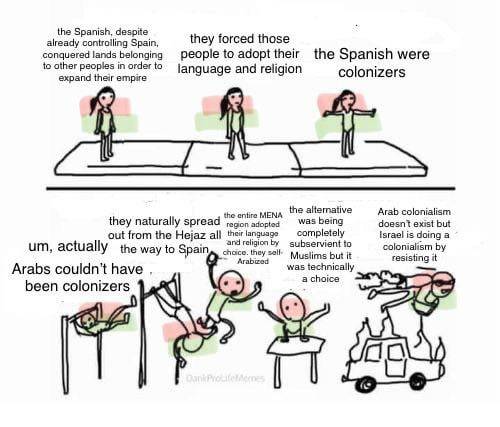
#memes#dank memes#jews are indigenous to israel#settler colonialism#history memes#geopolitics#colonialism#arabization#antizionism is antisemitism#ethnic cleansing#imperialism#arab imperialism#arab colonialism#middle east#spain#Israel#antisemitism#leftist antisemitism#left wing
539 notes
·
View notes
Text
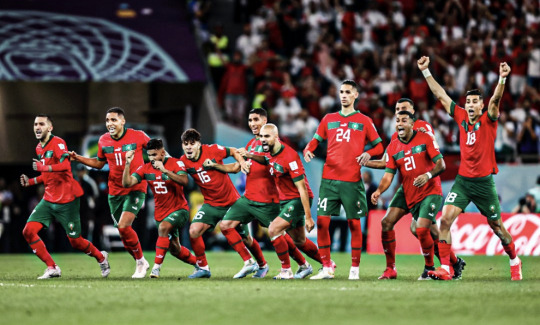

Being hosted in a Muslim country, Morocco become the first Muslim/African/Arab nation to make it into the Semi-Finals for the first time ever in the World Cup.
Morocco vs Portugal
December 10, 2022
#HISTORY FOR ARABS HISTORY FOR AFRICANS HISTORY FOR MUSLIMS#WORDS cannot begin to describe the joy that I am feeling right now#shaking with pride as if it’s my own country#EVERYONE SAY MASHAALLAH#Morocco#Morocco nt#Portugal#Portugal nt#World Cup#wc2022#my post
5K notes
·
View notes
Text


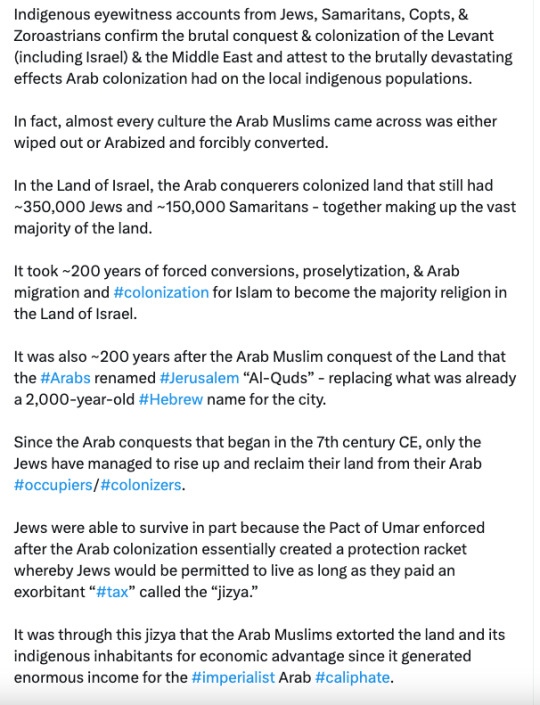


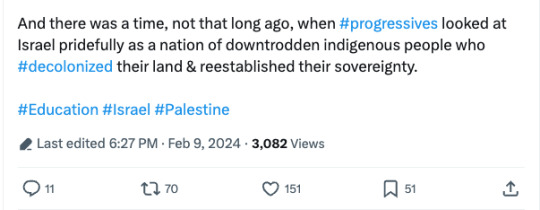
Source
#settler colonists#settler colonialism#arabs#muslims#history#conquerors#indigenous#israel#hamas#gaza
531 notes
·
View notes
Text
im sure its been said already but as the election draws near more and more liberals will come out of the woodwork to shame people with a conscience to give away their vote to the democrats for free. i'm already seeing posts saying "why aren't people more concerned about a trump presidency?" you want to know why? it's because people already know he's bad. everyone already knows what he is and what he's done and what he'll do. there's nothing to discuss. he's a racist despotic worm of a man. there's nothing else to say.
biden is currently president. the genocide is happening under his watch. he's the one funding isra*l and arming them; he's sidestepped congress more than once to give them weapons. by oct. 27, the biden administration already knew that "Israel was regularly bombing buildings without solid intelligence that they were legitimate military targets." the state department/biden have engaged in atrocity propaganda, cast doubt on the legitimacy of the death toll recorded by the gaza health ministry, and so on. the united states is currently in the process of trying to pin the "war in gaza" on netanyahu (see sen. schumer's speech) after months of backing blatant genocide as a means to act as if they're "doing something" about the genocide (Instead of, say, threatening to cut off all aid to israel with the condition that all hostilities in gaza, the west bank, and occupied jerusalem are halted immediately and permanently, allowing palestinians freedom to travel, allowing aid into gaza, etc etc etc.)
the long and short of it is that liberals view their own lives as being worth more than palestinians'. that's it. they'll vote for another 4 years of the guy ushering in genocide and supporting apartheid + settler colonialism because he isn't outright attacking them (despite various laws and rulings happening both at the supreme court level and at the local level all over the country that will endanger people). they'll settle for the illusion of safety and security and shame anyone with a conscience and accuse them of "supporting the republicans" when in an actual democracy you would be able to use your vote as leverage to extract concessions from those who want to be elected. that's how it's supposed to fucking work.
democrats are not owed people's vote. if biden loses, it will be biden's fault; it will be his campaign's fault; it will be the democrats' fault. trump is bad; the republicans are bad. we already know this. this is not an endorsement of either. but if democrats are too cowardly and feckless and servile to the motivations of the american empire and never do anything for their constituents then why the fuck should anyone vote for them. you want to get mad at someone, why don't you do something useful and stop worrying about team-sports with a purely selfish basis and start hounding the people in power who are supposed to serve you, the voter.
#i think i already said this and frankly idc#uspol#📁.zip#to me personally it's abhorrent and vile to tell palestinians 'biden is facilitating the murder of your people culture and history but you#still have to vote for him!!1' like how is that not unbelievably callous and ghoulish#frankly speaking. a lot of this 'you should be concerned about trump' is going to turn into#blaming palestinians and arabs and muslims and anyone remotely with a conscience for biden's loss#instead of doing something productive like pushing for people in power to do something they'll nitpick and belittle#and tell palestinians + arabs and muslims + everyone who understands that genocide is bad that they SHOULD#settle for a decrepit genocidal monstrous freak who is CURRENTLY facilitating genocide because#it makes THEM feel better and they aren't personally threatened (yet) by the guy currently in power#any and all 'you're not taking trump seriously' comments should be met with extreme skepticism#because i promise i PROMISE that the vast majority of people unhappy with biden are not going to turn around and vote for trump#and if they do? well guess what THAT'S BIDEN'S FAULT! nevermind the vote uncommitted campaign that was very successful and#will be replicated in the near future. but liberals only care about asthetics and superficial and not#about real material change which is why they'll dress up their callousness and racism in a 'you hate gay people if you dont vote for biden'#like this country is already going to shit we are rapidly descending into fascism and i dont see biden doing anything to even remotely#challenge it do you???? once agian. NOT an endorsement of the republican party but my GOD when the 'lesser evil'#is DOING the evil or normalizing the evil then you cannot settle for 'the lesser'! end of story.
393 notes
·
View notes
Text
Why We Can't Have Medieval Food
I noted in a previous post that I'd "expand on my thinking on efforts to reproduce period food and how we’re just never going to know if we have it right or not." Well, now I have 2am sleep?-never-heard-of-it insomnia, so let's go.
At the fundamental level, this is the idea that you can't step in the same river twice. You can put your foot down at the same point in space, and it'll go into water, but that's different water, and the bed of the river has inevitably changed, even a little, from the last time you did so.
Our ingredients have changed. This is not just because we can't get the fat from fat-tailed sheep in Ireland, or silphium at all anywhere, although both of those are true. But the aubergine you buy today is markedly different to the aubergine that was available even 40 years ago. You no longer need to salt aubergine slices and draw out the bitter fluids, which was necessary for pretty much all of the thing's existence before (except in those cultures that liked the bitter taste). The bitterness has been bred out of them. And the old bitter aubergine is gone. Possibly there are a few plants of it preserved in some archive garden, or a seed bank, or something, but I can't get to those.
We don't really have a good idea of the plant called worts in medieval English recipes. I mean, we know (or we're fairly sure) it was brassica oleracea. But that one species has cultivars as distinct as cabbage, broccoli, cauliflower, kale, Brussels sprouts, collard greens, Savoy cabbage, kohlrabi, and gai lan (list swiped from Wikipedia). And even within "cabbage" or "kale", you have literally dozens of varieties. If you plant the seeds from a brassica, unless you've been moderately careful with pollination, you won't get the same plant as the seeds are from. You can crossbreed brassicas just by planting them near each other and letting them flower. And of course there is no way to determine what varietal any medieval village had, a very high likelihood that it was different to the village next door, and an exceedingly high chance that that varietal no longer exists. Further, it only ever existed for a few tens of years - before it went on cross-breeding into something different. So our access to medieval worts (or indeed, cabbage, kale, etc) is just non-existant.
Some other species within the brassica genus are as varied. Brassica rapa includes oilseed rape, field mustard, turnip, Chinese cabbage, and pak choi.
We have an off-chance, as it happens, of getting almost the same kind of apple as some medieval varieties, because apples can only be reproduced for orchard use by grafting, which is essentially cloning. Identification through paintings, DNA analysis, and archaeobotany sometimes let us pin down exactly which apple was there. But the conditions under which we grow those apples are probably not the same as the medieval orchard. Were they thinned? When were they harvested? How were they stored? And apples are pretty much the best case.
Medieval wheat was practically a different plant. It was far pickier about where it would grow, and frequently produced 2-4 grains per stalk. A really good year had 6-8. In modern conditions, any wheat variety with less than 30 grains per stalk would be considered a flop.
Meats are worse. Selective breeding in the last century has absolutely and completely changed every single species of livestock, and if you follow that back another five centuries, some of them would be almost unrecognisable. Even our heritage breeds are mostly only about 200 years old.
Cheese, well. Cheese is dependent on very specific bacteria, and there are plenty of conditions where the resulting cheese is different depending on whether it was stored at the back or front of the cave. Yogurts, quarks, skyrs, etc, are also live cultures, and almost certainly vary massively. (I have a theory about British cheese here, too, which I'll expand on in a future post)
So, even before you go near the different cooking conditions (wood, burnables like camel and cow dung, smoke, the material and condition of cooking pots), we just can't say with any reliability that the food we're making now is anything like medieval people produced from the same recipe. We can't even say that with much reliability over a century.
Under very controlled conditions, you could make an argument for very specific dishes. If you track down a wild mountain sheep in Afghanistan, and use water from a local spring, and salt from some local salt mine, then you can make a case that you can produce something fairly close to the original ma wa milh, the water-and-salt stew that forms the most basic dish in Arabic cookery. But once you start introducing domestic livestock, vegetables, or even water from newer wells, you're now adrift.
It is possible that some dishes taste exactly the same, by coincidence. But we can't determine that. We can't compare the taste of a dish from five years ago, let alone five hundred, because we're only just getting to a state where we can "record" a taste accurately. Otherwise it's memory and chance.
We've got to be at peace with this. We can put in the best efforts we can, and produce things that are, in spirit, like the medieval dishes we're reading about. But that's as good as it gets.
#medieval cookery#medieval cooking#food history#historical cookery#historical cuisine#medieval arabic cookery#horticulture#genetics
1K notes
·
View notes
Text
𝚂𝚝𝚊𝚝𝚞𝚎 𝚘𝚏 𝙿𝚛𝚒𝚗𝚌𝚎𝚜𝚜 𝚃𝚊𝚔𝚞𝚜𝚑𝚒𝚝, 𝚌.670 𝙱𝙲 🇪🇬
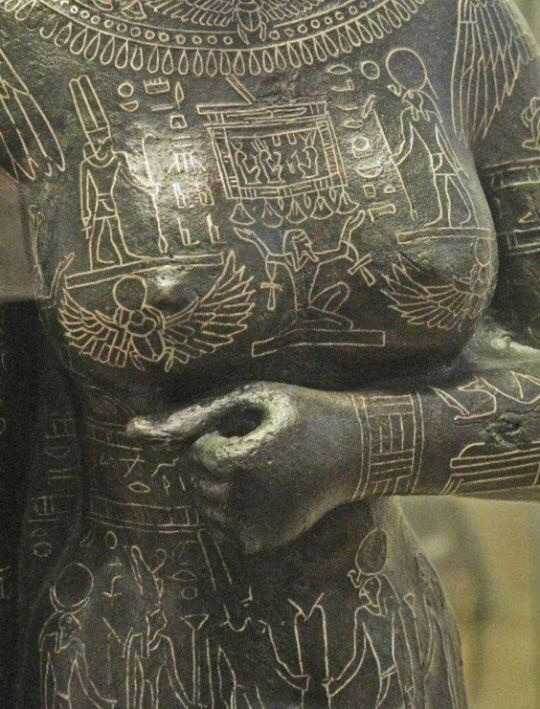
#l o v e#Takushit#12/2023#egypt#art history#statue#sculpture#ancient history#history#classic art#x-heesy#princess#culture#Orient#arabic art#mythology#body cult
480 notes
·
View notes
Text
Characters reconnecting with their ancestral cultures in an interplanetary setting
@pixiedustandpetrichor asked:
Hi! I am writing a novel with three main female characters in an interplanetary setting. They grow up as orphans in an Irish-coded country and as children are mostly exposed to solely that culture, but they leave after becoming adults.
Character A is Tuareg-coded, B Mongolian-coded, and C is Germanic-coded. It isn’t central to the story, but I would like them to get in touch with/learn more about their ancestral cultures, especially in terms of religion. A does this by actually visiting the planet her parents came from, but B and C do not.
What can I do to depict their relationships with said cultures and their journey to reconnect with them? Would it be realistic for each of them to have different mixed feelings about participating in these cultures and for them to retain some sense of belonging to the culture they grew up in as well? Thank you for your time.
Hello, asker! WWC doesn’t have Tuareg or Mongol mods at the moment, so we're not able to speak to the specifics of cultural and religious reconnection for these particular groups. Still, I want to take this opportunity to provide some general context and elements to consider when writing Tuareg-coded characters, or other characters from groups that have experienced colonization in the real world. My fellow mods will then share thoughts about cultural reconnection in general and with respect to Germanic heritage in particular.
Drawing inspiration from groups that have experienced colonization
As you’re probably aware, the Tuareg are an ethnic group indigenous to North Africa. As with many indigenous groups, they have experienced colonization multiple times over the course of their history. Colonization often leads to the loss or erasure of certain aspects of culture as the colonized people are pressured to conform to the culture of the dominant group. In many cases, it’s near impossible to say what the ancestral culture of a colonized group was prior to colonization.
When coding a fictional culture based on a group that was colonized in the real world, it's important to ask questions about:
Which aspects of culture you're portraying
Where these aspects come from
Whether you're ready to tackle their implications for the world you're building
It’s not necessarily wrong to use elements of coding that draw from cultural aspects influenced by colonization. As I said, it can be very difficult, even impossible, to portray a “pure” culture as it would have been had colonization not occurred–because we simply can’t know what that alternate history would look like, and because so much has been lost or intentionally suppressed that the gaps in our knowledge are too wide to breach. But it’s important to be aware of where these cultural elements are coming from.
Where is your coding coming from and what are the implications?
For example, while the Tuareg today are majoritarily Muslim, this was not the case prior to the Arab conquest of North Africa. Some elements of Tuareg culture today, such as tea ceremonies, are derived from the influence of Arab and Muslim culture and likely did not exist prior to the 20th century. As you’re developing the culture of the Tuareg-coded group in your fictional setting, you have to decide whether to include these elements. There is no right answer–it will depend on what you’re trying to do and why.
Is your setting in our far future, in which case we can assume your Tuareg-coded group is distantly related to today’s Tuareg?
In that case, they will probably have kept many cultural aspects their ancestors acquired through their interactions with other cultures around them–including cultural groups that colonized them. They may–let’s build hopeful worlds!–have reclaimed aspects of their ancestral culture they’d been forced to abandon due to colonization. They may also have acquired new aspects of culture over time. This can be very fun to explore if you have the time and space to do so.
I would recommend speaking with Tuareg people to get a better grasp of how they see their culture evolving over the next however many centuries or millennia, what they wish to see and what seems realistic to them.
Alternatively, maybe your setting is a secondary world unrelated to ours and you only want to draw inspiration from the real-world Tuareg, not represent them exactly. In that case, you need to decide which period of history you’re drawing from, as Tuareg culture is different today from what it was 50 years ago, and different still from 200 years ago or 1000 years ago. You’ll need to research the historical period you’re choosing in order to figure out what was happening at that time and what the cultural influences were. If it’s pre-colonial, you’ll probably want to avoid including cultural elements influenced by colonization from groups that arrived later on.
Finally, if the time period you’re drawing from is post-colonial:
Are you planning to account for the effects of colonization on Tuareg culture?
Will you have an in-world equivalent for the colonization that occurred in real life?
For example, will the Tuareg-coded characters in your world be from a nomadic culture that was forced to become sedentary over the years and lost much of their traditions due to colonial pressure to conform?
Where did this pressure come from in your world–is it different from what happened in ours? If so, how different? And what are the consequences?
Writing about colonization can be quite the baggage to bring into a fictional setting. I’m not saying it can’t be done, but it will certainly require sensitivity and care in portraying it.
In summary: think it through
I’m not saying all this to discourage you, but to point out some of the considerations at play when drawing inspiration from a real-life culture that has experienced colonization. Similar challenges arise for coding based on any other indigenous group in the world.
My advice to you, then, is to first sit down and decide where and when in history your coding is coming from, and what you’re trying to achieve with it. This will help you figure out:
which elements of contemporary Tuareg culture are pertinent to include
How much your coding will be influenced by the Tuareg’s real-life history
To what extent that will inform the rest of the world you’re creating
This, in turn, may help in deciding how to portray your character’s reconnection journey.
Again, I am not Tuareg and this is by no means meant to be an exhaustive list of considerations for writing Tuareg-coded characters, only a few places to start.
If any Tuareg or Amazigh readers would like to chime in with suggestions of their own, please do. As always, please make sure your comments adhere to the WWC code of conduct.
- Niki
Pulling from diaspora and TRA narratives of cultural reconnection
Marika here: This ask plotline could also pull directly from diaspora and TRA narratives of cultural reconnection. Many diaspora and TRA cultural reconnection stories are, in effect, about navigating the difficult process of resuscitating, or renewing ties to culture using limited resources in environments that often lack necessary cultural infrastructure or scaffolding.
See this question here to the Japanese team for suggestions of how to handle such a storyline in a similar sci-fi setting.
More reading: Japanese-coded girl from future
-Marika
Reconnecting with German heritage
Hi, it’s Shira. I’m not sure whether German-Jewish counts as Germanic for the purposes of your post but since German Jews were more assimilated than other Ashkies, Germanness does feel real and relevant to my life (especially because my father worked there for approximately the last decade of his life.) NOTE: when I see “Germanic” vs German I think of cultures from 1500 years ago, not 100-200 years ago, so I can’t help you there, but I’d be surprised as a reader if a character focused on that for reconnection to the exclusion of the 19th century etc.
People in the United States specifically, reconnecting with German heritage, often lean into Bayerischer/Bavarian kitsch, I’ve noticed. Personally, though, what I find most relevant is:
1. The food (although I’ve come to learn that what I grew up eating was closer to veal/chicken scallopini than actual schnitzel because it was drenched in lemon, but I do like the other foods like the potato salad and sweet and sour red cabbage etc.) Your character could try making one of these “ancestral” foods as a way to reconnect?
2. The classical music, because I’m a second generation professional musician – if character C plays an instrument, leaning into that might be meaningful (Beethoven, Bach, Brahms, Mendelssohn, Clara Schumann and her husband Robert, etc.)
3. The nature, especially specifics that I enjoyed during my time there – personally, I loved the bright pink flowers all over the chestnut trees, but there are a lot of choices especially because of the Alps. If C is an artist maybe they can sketch something Germany-related from old photographs they found on the Space Internet?
I think it is VERY realistic for the characters to remain connected to the culture in which they were raised, by the way, whether or not they have positive feelings about it. Culture isn’t an inherited trait. Sure, if they want to completely walk away, they can, but I bet there are still ways it will creep back in without them realizing it simply because it’s really hard to have universal knowledge of the origins of all our quirks. Plus, not everyone feels alienated from their raised-culture just because they’re genetically something else.
P.S. There is also Oktoberfest, which I don’t really get into but is a thing, and beer, which is another point of German cultural pride.
German gentiles, weigh in – y’all have your own stuff, I know! OH YEAH so for German Christians, Christmas “markets” are a whole thing. That’s worth looking up.
–S
What do you mean by Germanic?
Hello it’s Sci! I had to study German history for my historical fantasy novel set in the late 18th century Holy Roman Empire. I am not sure what is meant by Germanic as that can encompass a variety of things.
Germanic people: from the Classical Period of Roman Empire and early Middle Ages. Similar to Mod Shira, I unfortunately can’t help very much here.
The Germanosphere: regions that spoke German, which includes modern day Germany, Austria/Hungary, Switzerland, Lichtenstein, Belgium, and Luxembourg. I generally define this as the regions captured in the Hapsburg Empire along with Switzerland usually encompassing “Central Europe.”
Modern German national identity (i.e. German): post Napoleon and the Congress of Vienna (> 1815) only including the territory of modern day Germany.*
I ask this because modern German national identity is surprisingly recent since Germany only popped up in 1871 under Otto von Bismarck. Previously, Germany was divided into smaller states and city states as a very decentralized region under the German Confederation and before that, the Holy Roman Empire. Depending on the era, you can see different conflicts and divides. During the early days of the Protestant Reformation started by Martin Luther, the northern and southern German territories generally split along Protestant-Catholic lines. The 18th century saw Austria and Prussia as the foci of global power who warred against each other even though both were part of the Holy Roman Empire.
Other states and city-states like Baden-Wurttemberg or Saxony sometimes had power but it was typically more localized compared to Austria. Post-WW2, you saw the split of Germany into West Germany run under capitalism and East Germany run under communism as a satellite Soviet state leading to more modern cultural divides. Due to heavy decentralization historically, each region had its own character with religious and cultural divides.
Assuming that the Germanic character is not from the classical period or early Middle Ages but not from the 19th century either, you can include your character reconnecting to classical folklore like that of Krampus (if they’re Christian), German literature and music like the works of Johann Wolfgang von Goethe or Mozart, or German philosophy like Immanuel Kant.
*A major wrinkle: German royals and nobility married into other states and nations frequently with Britain and Russia being notable examples. In Britain, the House of Hanover took over after the Stuart House died without clear direct heirs. When Queen Victoria married the German prince Albert, they celebrated Christmas with a tree and brought the German tradition of a Christmas tree to Britain and the British Empire. Only during World War I did the royal family’s house of Hanover name change from House of Saxe-Coburg and Gotha to the more “English-sounding” Windsor. As a result, the German cultural influence may be even more widespread than we think.
However, without more specific descriptors of what Germanic means in the context of your story, it can be difficult to determine which aspects of German culture your character could reconnect to.
-Mod Sci
#culture#cultural disconnect#cultural reconnect#race coding#ethnic coding#German#Mongol#Tuareg#setting#science fiction#Jewish#Colonialism#History#North Africa#Arab#Muslim#history
343 notes
·
View notes
Text


It's autism acceptance month, you know what that means!-
#it means I'm gonna hyperfixate on this peculiar little guy#happy autism awareness month!#enjoy these memes#he's truly mr. autism#he's everything#i'll for sure be making more btw. its only day 3 of autism month#I can spread so many more terrible images <3#star trek#ds9#deep space nine#star trek fanart#deep space 9#star trek ds9#star trek deep space nine#star trek art#bashir#ds9 bashir#dr bashir#julian bashir#doctor bashir#autism#neurodiversity#autistic#autism awareness month#it's also arab history month it's truly his month <3
339 notes
·
View notes
Text

﴿ إِنَّ هَٰذَا لَهُوَ الْفَوْزُ الْعَظِيمُ﴾ 🌿
#يوميات بنت إسمها ش#egypt#مصر#photography#thisisegypt#art#masterpiece#cairo#shaimaa fekry#architecture#callegraphy#islamic#mosque#heritage#culture#history#travel#old city#quran#arabic#arabic calligraphy#سورة الصافات
152 notes
·
View notes
Text
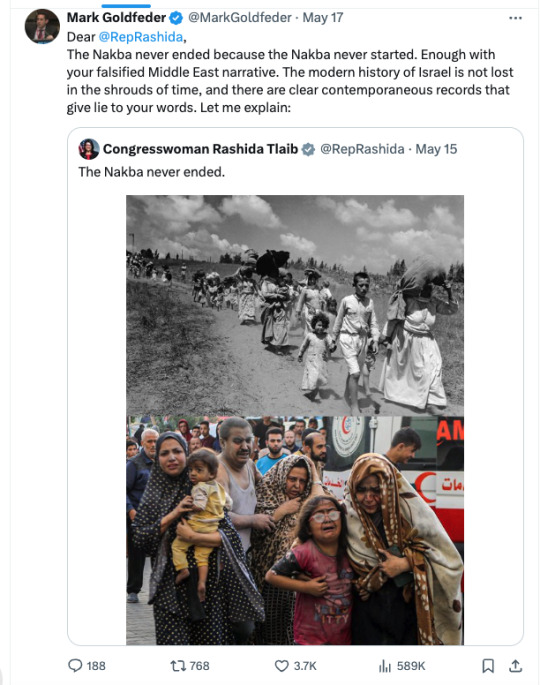
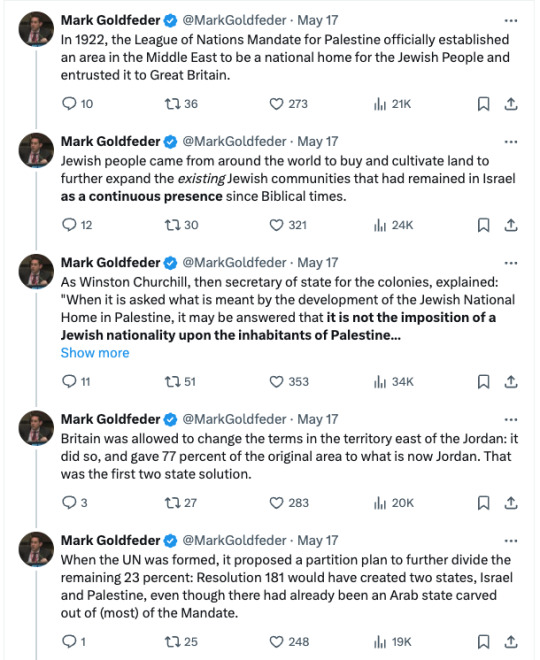
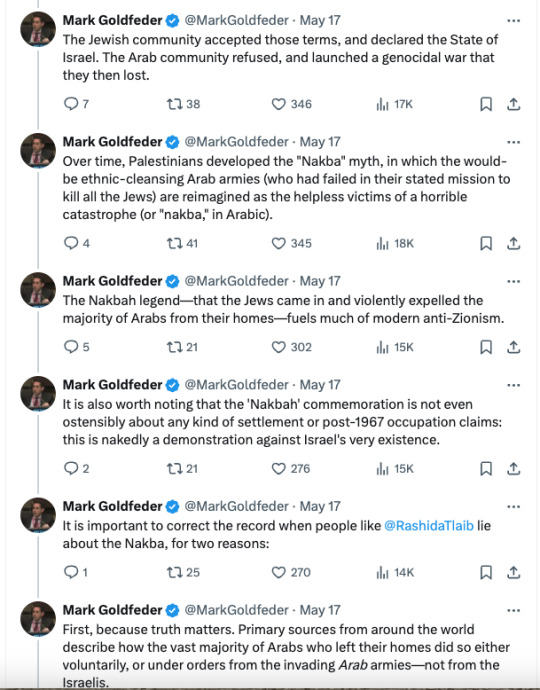

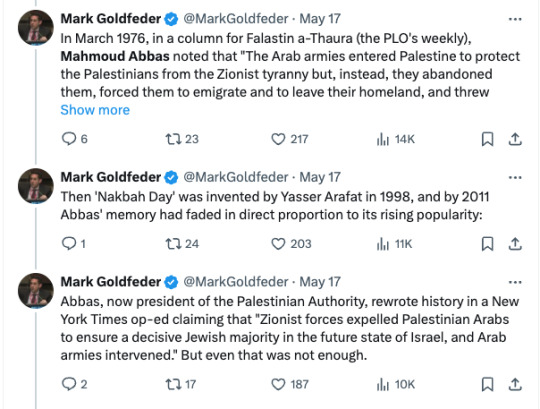


Source
#the nakba#rashida tlaib#history#palestinians#arabs#two state solution#united nations#un partition plan
203 notes
·
View notes
Text
April 7th, six months into the war
Since I woke up terrified, and had to run for my bomb shelter. I had to barricade myself in my house in case terrorists came.
I’ve never imagined that this war could happen let alone go on for so long.
People I know died, people I know were kidnapped (and thankfully rescued).
Thousands of rockets were fired, and I’ve had to run for my life countless times. For months my house was rattled by rockets, airplanes and bombings. Even my dogs are scared of random loud noises by now.
I also can’t recall a time *in my life* when so many foreign armies/ terror groups attacked us at once. There was a rise in violence and terror attacks.
Yet people here seem to have lost it: I’ve never saw so much antisemitism and bigotry. I’ve personally been sent death threats and slurs, and been harassed. All from seemingly peaceful and educated people, fuelled by misinformation, antisemitic rhetoric and blood libels.
The new trend is hating & harassing every Jews and Israeli in sight . Calling us Nazis and telling us we deserve it, and then having the nerve saying it’s about Zionism, not antisemitism.
There are currently 133 hostages still kept in captivity by Hamas, along with dozens of bodies
Bring them home now. Silence is unacceptable.
#israel#jewish#israeli#jewblr#israel palestine conflict#gaza strip#טאמבלר ישראלי#ישראל#hamas is isis#human rights#gaza#iran#middle east#middle eastern history#arab israeli conflict#עברית#ישראלי#jumblr#jewish culture is#jewish antizionism#current event#feminism
160 notes
·
View notes
Text
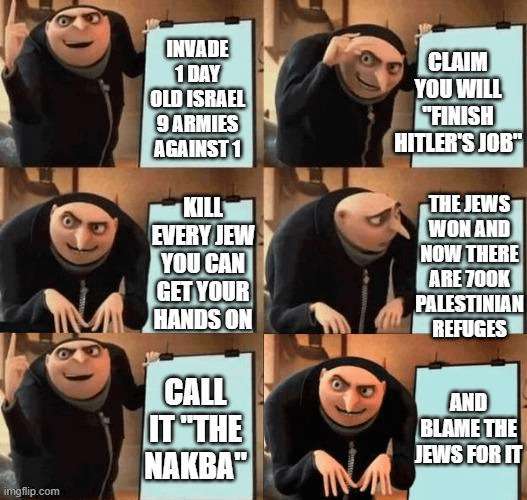
#naqba#nakba#jumblr#1948#palestine#middle east#israel#ישראל#historic antisemitism#historical revisionism#historical revisionism is antisemitism#memes#history#history memes#israeli history#palestinian history#arab colonialism
422 notes
·
View notes
Text
Book recommendations for reading on Palestine with overviews or access to the content:
The Hundred Years' War on Palestine - A History of Settler Colonialism and Resistance, 1917 - 2017 by Rashid Khalidi
The Palestinian - Israeli Conflict: A Very Short Introduction by Martin Bunton
Voices of the Nakba: A Living History of Palestine edited by Diana Allan
Freedom is a Constant Struggle - Ferguson, Palestine, and the Foundations of a Movement by Angela Y. Davis
The Palestine Laboratory - How Israel Exports the Technology of Occupation Around the World by Antony Loewenstein
Ten Myths About Israel by Ilan Pappé
The Ethnic Cleansing of Palestine by Ilan Pappé
On Palestine by Noam Chomsky & Ilan Pappé
A History of the Arab Peoples by Albert Huraini (Afterword by Malise Ruthven for later editions)
#palestine resources#palestinian books#palestine#free palestine#book recommendations#book rec list#palestine history#nakba#educate yourselves#gaza#free gaza#current events#social justice#knowledge is power#the more you know#arab history#booklr#i stand with palestine#pro palestine#🍉#free palestine 🇵🇸#rashid khalidi#martin bunton#diana allan#angela davis#antony loewenstein#ilan pappe#noam chomsky#albert huraini#malise ruthven
345 notes
·
View notes
Text

palestinian women collecting fruit 🤍
3K notes
·
View notes